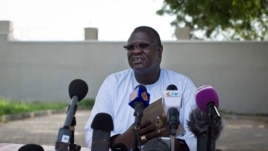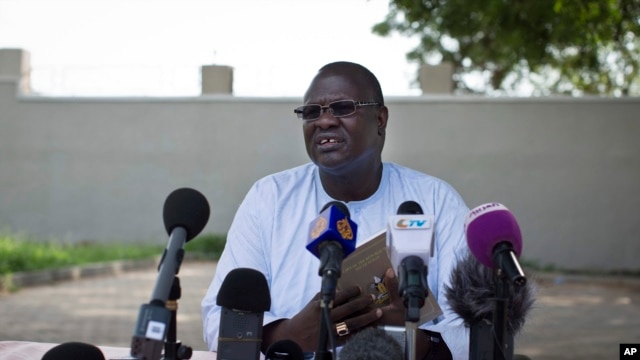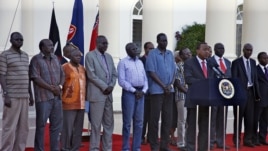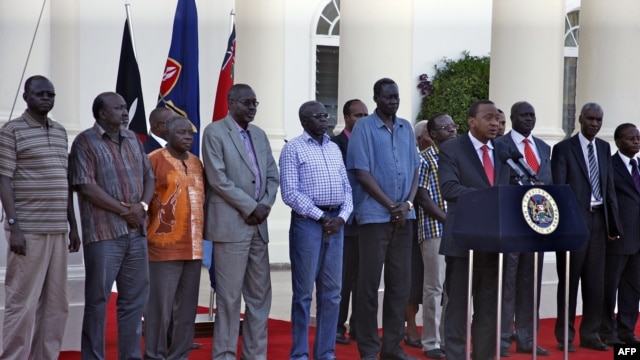----- Forwarded Message ----- From: South Sudan Press
To: wanabidii@googlegroups.com
Sent: Tuesday, February 4, 2014 10:41 AM
Subject: [wanabidii] UPDF, JEM, and SPLA-North Forces Must Leave South Sudan
Re: Press release on the political detainees and the immediate withdrawal of all the Foreign Forces
February 3, 2014 (SSNA) -- We in the SPLM/SPLA in the opposition Youth League, wholeheartedly welcome the release of the Seven Political detainees by the government of Salva Kiir in Juba and reiterate our call for unconditional release of the remaining four political detainees still under the custody of Salva Kiir, led by comrade Pagan Amum the Secretary General of the SPLM.
The SPLM/SPLA Youth League in Opposition appreciated the efforts exerted by the IGAD mediators, AU, EU, Norway, US and the UK in securing the signing of the cessation of hostilities and the release of the seven political detainees.
The SPLM/SPLA Youth League in Opposition further urge IGAD, AU and the Partners to condemn the frequent attacks being carried out, particularly after the signing of the cessation of hostilities by the UPDF, JEM, SPLA North and Kiir forces on the civilian targets, which is against the 1949 Geneva Convention and the articles of the cessation of hostilities.
We condemn in the strongest terms possible the preposterous indictments of Cde. Dr. Riek Machar Teny, Cde.Gen. Taban Deng, Cde. Chief Ideologue Alfred Lado Gore and the four comrades led by the Secretary General of the SPLM who are still under the custody of Salva Kiir. We know very well that these comrades are not indicted by the law but by Kiir because the whole world knows that, there was no coup and we are calling up on Kiir to reverse the claim indictment and indict those who have been commanding and still command the killing of the innocent civilian in Juba, Malakal, Bentiu, Bor and all the areas controlled by UPDF, JEM , SPLA NORTH and his Forces.
The last but not the least, the SPLM/SPLA Youth League in Opposition call upon all the Youths across South Sudan and the SPLM world wide to demand the immediate release of the four political detainees, immediate withdrawal of the UPDF, JEM, SPLA North and the immediate indictment of those responsible for the Juba Nuer massacre.
Cde. Puot Kang Chol
SPLM/SPLA Youth League in Opposition Representative
SPLM/SPLA Youth League in Opposition Representative
============================================
Tuesday 4 February 2014
South Sudan army chief warns against involvement in politics
February 3, 2014 (JUBA) - South Sudan’s army (SPLA) chief of general staff on Monday broke his long silence on the country’s six-week old conflict, warning the military against involvement in any political warfare.

- Chief of Staff of South Sudan’s army, General James Hoth Mai speaks during a media update with regards to the current fighting with rebels in north of the country, in Juba January 2, 2014 (REUTERS/James Akena)
He also warned the country’s politicians to avoid uttering inflammatory statements that could invoke ethnic emotions and lead to further escalation of violence.
According to the International Crisis Group (ICG), an estimated 10,000 people have died in the conflict, which started in Juba and spread to Jonglei, Unity and Upper Niles states as the army engaged defectors and armed civilians.
The split in the military followed a battle for control of South Sudan’s ruling party (SPLM) between President Salva Kiir - a Dinka - and his former deputy Riek Machar - a Nuer, which intensified after Kiir sacked the latter in July last year.
Both sides have been accused of abuses and in some instances the fighting has taken on a ethnic dimension, despite political supporters of both men being from the various ethnic groups in the country.General Mai, himself a Nuer, is a military veteran from over two decades of conflict between the SPLA and the Sudanese government for the right to secede. South Sudan may have achieved its independence more than two years ago, but many still view the SPLA as a liberation army with no political structures.
The head of the army, however, said some South Sudanese politicians failed to understand the suffering of the 740,000 people displaced by the conflict.
"I spent all my life in guerrilla wars to achieve independence. I’m not happy seeing people of South Sudan suffering, which is what I see. The politicians don’t see it," said Mai in statements on multiple social media and news websites.
He advised South Sudan government and its rebels groups to strike a political deal seeking an end to the conflict, which nearly turned into a full-blown civil war.
"The military cannot solve the political problem that needs to be solved politically," said the senior military officer.
"We have given room for the politicians to solve this issue to serve the country," he added, stressing the importance of dialogue among the country’s warring parties.
ADMITS ARMY HAS CHALLENGES
Meanwhile, Gen. Mai also admitted the army still had some challenges that needed to be dealt with as the young nation’s army transforms into a professional force.
"Yes we have a problem. The SPLA is composed of different militias most of whom haven’t gone through training. They’re from the village and they can’t read or write; they don’t know anything but loyalty to their local commander who identifies with them," said the ex-graduate of South Africa’s University of Fort Hare.
He, however, observed that it was better for the army to "stay outside the political equation", emphasising the neutral role national armies play in protecting the country’s sovereignty.
The top army general also admitted that atrocities were committed by both sides during the conflict, but denied allegations that government forces looted several medical facilities when recapturing towns under rebel control.
"We have heard such reports and so we decided to form a committee to investigate these allegations," Gen. Mai told Sudan Tribune last week.
This committee is still conducting the investigation whose findings will be made public after completing the assignment, he added.
CHURCH WANTS REFORM IN ARMY
Various Church leaders in the country recently called for “urgent” reforms among the South Sudan’s organised forces, mainly the national army and police.
“Our army has grown in size since the signing of the CPA [Comprehensive Peace Agreement] and has become a significant cost to our nation, at the expense of investment in development priorities. It lacks cohesion," partly reads last week’s joint statement issued by the Church leaders.
"We are conscious of the need to address reconciliation within the armed forces themselves. There is no longer any place for personal militias," it adds.
The clerics also said they wanted the national army name changed and that it should have no association with any of the country’s political entities.
“We believe our armed forces need urgent support and pastoral care. We also feel that our national army needs a new name, not associated with a single political party," further read the joint statement, adding "A professional army should never be involved in politics"
(ST)=======================
Tuesday 4 February 2014
South Sudan academics seek inclusive dialogue, comprehensive reform
February 3, 2014 (JUBA) - South Sudanese academics from various international universities have called for inclusive dialogue to resolve the six-week-old conflict in the world’s youngest nation, according to a proposal Sudan Tribune has seen.
The academics pointed to the necessity to carry out radical and comprehensive reforms across the board to address the root causes of the political tension that triggered the fighting, which began on December 15.Released to the public on February 1, the proposal entitled "Unleashing the potential for good governance in the Republic of South Sudan" provides recommendations on numerous issues. Some of which include, governance, democracy and rule of law, stronger and effective federal system, corruption, accountability and transparency.
South Sudan’s national army (SPLA) - mainly a coalition of armed groups who were active during the civil war which ended in a 2005 peace deal that allowed the country to secede from Sudan in 2011 - is also in urgent need of reform, the document said.
Since the fighting began in mid-December large sections of the army defected from the main barracks in the capital Juba and from Jonglei, Unity and Upper Nile states.
The academics also suggested that South Sudan needs an effective and efficient taxation system, a renewed emphasis on asset recovery, and addressing the issue of land grabbing, which is one of the causes of conflict across the country.
As many as one million people have been displaced during the conflict, according t the United Nations.
The paper argued that issues involving the relations of internally displaced persons with host communities, not only from the current conflict but for those who have still not returned to their homes since the end of the civil war with Sudan.
The group of South Sudanese academics said that adherence to the rule of law and respect of constitution needed to be improved, as well as recommending that Presidents only be allowed to serve two terms in office.
Delivery of public services to the people, as well as improving the economy through attracting investment in education, infrastructure, oil and tourism.
The restructuring of the civil service featured in the proposals in order to improve the accountability and democracy of the country’s nascent institutions. Corruption is a major issue in the young nation with around $4 billion in oil revenues acknowledged to have gone missing by President Salva Kiir Mayardit.
The proposal also observed that South Sudanese military is heavily dominated by two ethnic groups - the Dinka and Nuer tribes - and is not representative of the population, citing ongoing crisis as one of the evidences.
"As recent events have shown, political rivalry and tension between these groups can quickly degenerate into widespread violence with dire consequences not only to them, but to everyone else. It is important to remember that South Sudan has over 60 ethnic groups. This means that the vast majority of the citizens do not see themselves represented in the military”, the proposal says.
It argues that South Sudanese people yearn for a disciplined, professional, ethnically representative and balanced military that not only protects them, but also helps the country to live up to its promise of justice, liberty and prosperity for all.
One of the radical reforms is the part of the proposal which seeks the armed forces to be a neutral body when it comes to politics involving political leaders within institutions.
"A neutral force, not a partisan one, acceptable to all may be necessary to help with the process of professionalizing the army, for about 18 months", the proposal suggests.
The proposal calls for an inclusive national dialogue once the cessation of hostilities agreement has been fully implemented and respected by the parties to the conflict.
"The reform and restructuring of the armed forces, the security services and the civil service should be a matter of urgency. Once the modalities and mechanism for monitoring the Cessation of Hostilities Agreement are in place and the peace talk extends into the issues of governance, democratization and resource management, all stakeholders need to be involved. Admission must not be based solely on the size of one’s gun. The stakeholders to be involved should include the various political parties, women’s groups, youth groups, religious leaders, academics, the Diaspora, and the civil society", it stressed.
It recommends that the sitting president, Salva Kiir, should be allowed to complete his remaining term of office, stressing that it would set a dangerous precedent. Kiir accuses his former deputy Riek Machar of attempting to oust him in a coup on December 15 but this is denied by Machar and his supporters.
The academics recommend the formation of a broad based and inclusive government to conduct a national census, complete of the writing of the constitution and run the elections scheduled for 2015.
Abraham Jok, a native of Abyei - an oil-producing contested with neighbouring Sudan - said the proposal expressed the “obvious issues”, stressing that he doubts whether the proposal would draw significant attention from ruling elite.
The proposal "expressed the obvious and practical" solutions to South Sudan’s problems.
"All that is in the proposal is all what our people had wished from the day we started running our own affairs in 2005. Everybody accepts transforming the SPLA into a disciplined [force] so that it looks more [like a] professional army" he said.
"Also, our people have been looking for a decent and representative constitution and the government which diversifies the economy instead of relying largely on oil revenues", Jok told Sudan Tribune on Monday.
Anthony Sebit, a political analyst, told Sudan Tribune in a separate interview that South Sudanese would massively support a system that provides broad-based mechanisms for addressing political differences within or between political institutions and peacefully accepts the transfer of power without the use of violence.
"From my reading of the events in this country, our people are tired of war but they need change. They do not want leaders who resort to violence as a means to remain in power or ascend to it, especially the people in Greater Equatoria. I don’t know much about other regions but given the level reaction of reactions and interactions with different leaders from other regions, I find that South Sudanese do not prefer war. They use war as the last resort, which can be avoided if there strong leadership”, said Sebit
(ST)
Download the full report here:

COMMENTS:
4 February 06:37, by omoni jr.
"All good things must come to an end"
1- what caused the rebellion in south sudan?
The answer is the killing of one tribe,and that tribe felt unsafe,so they defended themselves and revenged too.
2-why salva kiir tried to disarmed one tribe and rearmed his own tribe? He disarmed them so that his gangs can kill them easily without any force of resistances.
1- what caused the rebellion in south sudan?
The answer is the killing of one tribe,and that tribe felt unsafe,so they defended themselves and revenged too.
2-why salva kiir tried to disarmed one tribe and rearmed his own tribe? He disarmed them so that his gangs can kill them easily without any force of resistances.





No comments:
Post a Comment